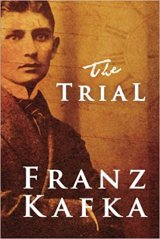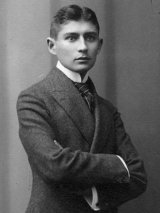The Trial Page #12
The Trial is a novel written by Franz Kafka between 1914 and 1915 and published posthumously on 26 April 1925. One of his best-known works, it tells the story of Josef K., a man arrested and prosecuted by a remote, inaccessible authority, with the nature of his crime revealed neither to him nor to the reader. Heavily influenced by Dostoevsky's Crime and Punishment and The Brothers Karamazov, Kafka even went so far as to call Dostoevsky a blood relative. Like Kafka's other novels, The Trial was never completed, although it does include a chapter which appears to bring the story to an intentionally abrupt ending.
The left hand side of the hall was still quiet, though, the people stood there in rows with their faces looking towards the podium listening to what was being said there, they observed the noise from the other side of the hall with the same quietness and even allowed some individuals from their own ranks, here and there, to go forward into the other faction. The people in the left faction were not only fewer in number than the right but probably were no more important than them, although their behaviour was calmer and that made it seem like they were. When K. now began to speak he was convinced he was doing it in the same way as them. "Your question, My Lord, as to whether I am a house painter - in fact even more than that, you did not ask at all but merely imposed it on me - is symptomatic of the whole way these proceedings against me are being carried out. Perhaps you will object that there are no proceedings against me. You will be quite right, as there are proceedings only if I acknowledge that there are. But, for the moment, I do acknowledge it, out of pity for yourselves to a large extent. It's impossible not to observe all this business without feeling pity. I don't say things are being done without due care but I would like to make it clear that it is I who make the acknowledgement." K. stopped speaking and looked down into the hall. He had spoken sharply, more sharply than he had intended, but he had been quite right. It should have been rewarded with some applause here and there but everything was quiet, they were all clearly waiting for what would follow, perhaps the quietness was laying the ground for an outbreak of activity that would bring this whole affair to an end. It was somewhat disturbing that just then the door at the end of the hall opened, the young washerwoman, who seemed to have finished her work, came in and, despite all her caution, attracted the attention of some of the people there. It was only the judge who gave K. any direct pleasure, as he seemed to have been immediately struck by K.'s words. Until then, he had listened to him standing, as K.'s speech had taken him by surprise while he was directing his attention to the gallery. Now, in the pause, he sat down very slowly, as if he did not want anyone to notice. He took out the notebook again, probably so that he could give the impression of being calmer. "That won't help you, sir," continued K., "even your little book will only confirm what I say." K. was satisfied to hear nothing but his own quiet words in this room full of strangers, and he even dared casually to pick up the examining judge's notebook and, touching it only with the tips of his fingers as if it were something revolting, lifted it in the air, holding it just by one of the middle pages so that the others on each side of it, closely written, blotted and yellowing, flapped down. "Those are the official notes of the examining judge," he said, and let the notebook fall down onto the desk. "You can read in your book as much as you like, sir, I really don't have anything in this charge book to be afraid of, even though I don't have access to it as I wouldn't want it in my hand, I can only touch it with two fingers." The judge grabbed the notebook from where it had fallen on the desk - which could only have been a sign of his deep humiliation, or at least that is how it must have been perceived - tried to tidy it up a little, and held it once more in front of himself in order to read from it. The people in the front row looked up at him, showing such tension on their faces that he looked back down at them for some time. Every one of them was an old man, some of them with white beards. Could they perhaps be the crucial group who could turn the whole assembly one way or the other? They had sunk into a state of motionlessness while K. gave his oration, and it had not been possible to raise them from this passivity even when the judge was being humiliated. "What has happened to me," continued K., with less of the vigour he had had earlier, he continually scanned the faces in the first row, and this gave his address a somewhat nervous and distracted character, "what has happened to me is not just an isolated case. If it were it would not be of much importance as it's not of much importance to me, but it is a symptom of proceedings which are carried out against many. It's on behalf of them that I stand here now, not for myself alone." Without having intended it, he had raised his voice. Somewhere in the hall, someone raised his hands and applauded him shouting, "Bravo! Why not then? Bravo! Again I say, Bravo!" Some of the men in the first row groped around in their beards, none of them looked round to see who was shouting. Not even K. thought him of any importance but it did raise his spirits; he no longer thought it at all necessary that all of those in the hall should applaud him, it was enough if the majority of them began to think about the matter and if only one of them, now and then, was persuaded. "I'm not trying to be a successful orator," said K. after this thought, "that's probably more than I'm capable of anyway. I'm sure the examining judge can speak far better than I can, it is part of his job after all. All that I want is a public discussion of a public wrong. Listen: ten days ago I was placed under arrest, the arrest itself is something I laugh about but that's beside the point. They came for me in the morning when I was still in bed. Maybe the order had been given to arrest some house painter - that seems possible after what the judge has said - someone who is as innocent as I am, but it was me they chose. There were two police thugs occupying the next room. They could not have taken better precautions if I had been a dangerous robber. And these policemen were unprincipled riff-raff, they talked at me till I was sick of it, they wanted bribes, they wanted to trick me into giving them my clothes, they wanted money, supposedly so that they could bring me my breakfast after they had blatantly eaten my own breakfast in front of my eyes. And even that was not enough. I was led in front of the supervisor in another room. This was the room of a lady who I have a lot of respect for, and I was forced to look on while the supervisor and the policemen made quite a mess of this room because of me, although not through any fault of mine. It was not easy to stay calm, but I managed to do so and was completely calm when I asked the supervisor why it was that I was under arrest. If he were here he would have to confirm what I say. I can see him now, sitting on the chair belonging to that lady I mentioned - a picture of dull-witted arrogance. What do you think he answered? What he told me, gentlemen, was basically nothing at all; perhaps he really did know nothing, he had placed me under arrest and was satisfied. In fact he had done more than that and brought three junior employees from the bank where I work into the lady's room; they had made themselves busy interfering with some photographs that belonged to the lady and causing a mess. There was, of course, another reason for bringing these employees; they, just like my landlady and her maid, were expected to spread the news of my arrest and damage my public reputation and in particular to remove me from my position at the bank. Well they didn't succeed in any of that, not in the slightest, even my landlady, who is quite a simple person - and I will give you here her name in full respect, her name is Mrs. Grubach - even Mrs. Grubach was understanding enough to see that an arrest like this has no more significance than an attack carried out on the street by some youths who are not kept under proper control. I repeat, this whole affair has caused me nothing but unpleasantness and temporary irritation, but could it not also have had some far worse consequences?"
Translation
Translate and read this book in other languages:
Select another language:
- - Select -
- 简体中文 (Chinese - Simplified)
- 繁體中文 (Chinese - Traditional)
- Español (Spanish)
- Esperanto (Esperanto)
- 日本語 (Japanese)
- Português (Portuguese)
- Deutsch (German)
- العربية (Arabic)
- Français (French)
- Русский (Russian)
- ಕನ್ನಡ (Kannada)
- 한국어 (Korean)
- עברית (Hebrew)
- Gaeilge (Irish)
- Українська (Ukrainian)
- اردو (Urdu)
- Magyar (Hungarian)
- मानक हिन्दी (Hindi)
- Indonesia (Indonesian)
- Italiano (Italian)
- தமிழ் (Tamil)
- Türkçe (Turkish)
- తెలుగు (Telugu)
- ภาษาไทย (Thai)
- Tiếng Việt (Vietnamese)
- Čeština (Czech)
- Polski (Polish)
- Bahasa Indonesia (Indonesian)
- Românește (Romanian)
- Nederlands (Dutch)
- Ελληνικά (Greek)
- Latinum (Latin)
- Svenska (Swedish)
- Dansk (Danish)
- Suomi (Finnish)
- فارسی (Persian)
- ייִדיש (Yiddish)
- հայերեն (Armenian)
- Norsk (Norwegian)
- English (English)
Citation
Use the citation below to add this book to your bibliography:
Style:MLAChicagoAPA
"The Trial Books." Literature.com. STANDS4 LLC, 2025. Web. 24 Feb. 2025. <https://www.literature.com/book/the_trial_1052>.








Discuss this The Trial book with the community:
Report Comment
We're doing our best to make sure our content is useful, accurate and safe.
If by any chance you spot an inappropriate comment while navigating through our website please use this form to let us know, and we'll take care of it shortly.
Attachment
You need to be logged in to favorite.
Log In